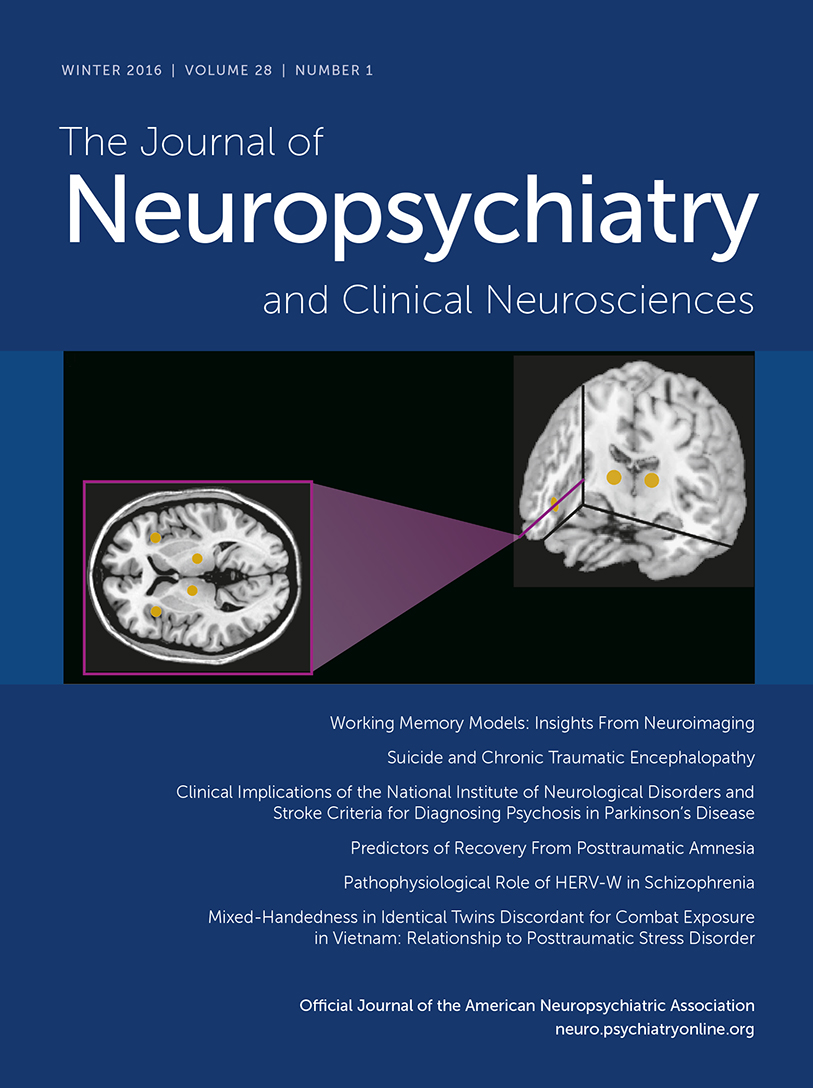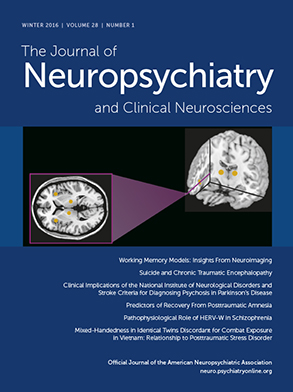Much as our Spring 2015 issue marked a season of change for the Journal,
1 so, too, does the present issue: after 27 years of visionary leadership and tireless dedication to the Journal, Stuart C. Yudofsky, M.D. is concluding his service as Editor of
The Journal of Neuropsychiatry and Clinical Neurosciences. Over the past several months, Dr. Yudofsky has gradually transitioned into the new role of Editor Emeritus, which he takes on officially in the present issue of the Journal. In this role, he will continue to provide us with advice and consultation on the Journal’s editorial direction, innovations, and operations.
It is customary for a new editor to offer thanks to and comments on the work of the departing editor, whom the successor editor sometimes knows only as a professional acquaintance in the field. I am fortunate, then, to have the privilege, honor, and advantage of offering thanks to and commentary on Dr. Yudofsky as someone who has enjoyed the great privilege of his mentoring, friendship, and generosity for many years.
Dr. Yudofsky began his medical career at the Baylor College of Medicine, from which he was graduated in 1970. He completed his residency in psychiatry at Columbia University College of Physicians & Surgeons in 1974, after which he began his career in neuropsychiatry there as chief of Columbia Presbyterian’s Neuropsychiatry Service (Neuro-12), located in the Neurological Institute and Hospital. Over the 10 years of his service there, he became a master neuropsychiatrist and academician. His exceptional clinical and teaching skills were coupled with a keen interest in studying brain-behavior relationships and developing and testing treatments for neuropsychiatric disorders—including pharmacological treatments for impulsive aggression associated with a panoply of brain disorders. With Jonathan Silver, M.D., he developed and validated the Overt Aggression Scale, an operationalized instrument to measure verbal and physical aggression. He also was recognized early as a highly effective administrator. He rose quickly to Associate Professor and Vice Chairman in the Department of Psychiatry, concurrent to which he was appointed Deputy Director of the New York State Psychiatric Institute and Deputy Chief of Psychiatry Services at New York Presbyterian Hospital.
In 1984, Dr. Yudofsky was recruited to Allegheny General Hospital to serve as Founding Director of their Psychiatry Department and Director of Psychiatric Research at the Allegheny Singer Research Institute. There, along with Beth Yudofsky, M.D., he focused on assessing and treating patients with traumatic brain injury, many of whom arrived in acute states through Allegheny’s Life Flight trauma care program. Four years later, he was recruited to the University of Chicago to serve as Professor and Chairman of the Department of Psychiatry. While there, he developed, with Fred Ovsiew, M.D., the first neuropsychiatry unit at The University of Chicago Hospitals and became an early member of the nascent American Neuropsychiatric Association (ANPA). It was in this context that he and Robert Hales, M.D., M.B.A., began discussing with American Psychiatric Press, Inc., then the publishing arm of the American Psychiatric Association, the creation of a new journal focused on neuropsychiatry. They brought this endeavor to fruition in the winter of 1989, during which the inaugural issue of The Journal of Neuropsychiatry and Clinical Neurosciences was published.
Dr. Yudofsky’s initial clarity of vision as its founding editor guided its development and growth over its nearly three decades of publication. Writing with Dr. Hales,
2 he began the first pages of the Journal’s first issue in 1989 thus:
Although there is considerable disagreement about just what neuropsychiatry comprises, fundamental to any definition is the indelible inseparability of brain and thought, of mind and body, and of mental and physical. Neuropsychiatry spans these interrelationships to enlarge our understanding of cognitive, emotional, and behavioral function and dysfunction… It is our hope that The Journal of Neuropsychiatry and Clinical Neurosciences, through its considerations and emphases, will define and strengthen this concept. A prominent focus of neuropsychiatry is the assessment and treatment of patients with psychiatric illnesses or symptoms associated with brain lesions or dysfunction.
Within three years, ANPA adopted
The Journal of Neuropsychiatry and Clinical Neurosciences as its official journal. As Randolf Schiffer, M.D., and colleagues,
3 writing on behalf of ANPA leadership and the Journal’s editorial team, in their editorial announcing marking the beginning of this relationship:
The affiliation of the ANPA and the Journal is based on a common conception of neuropsychiatry. The ANPA and the Journal both are committed to: 1) an interest in the psychiatric aspects of primary neurological diseases affecting the central nervous system, 2) an approach to primary psychiatric illness that emphasizes an appreciation of the roles of brain structure and function, 3) an effort to understand the pathophysiology of mental and behavioral symptoms and syndromes from a neurological point of view, seeing systems of psychiatric diagnosis and classification merely as provisional tools to assist with epidemiological study, record keeping, and interprofessional communication, 4) an approach to therapeutics characterized by scientific rigor, compassion, and optimism, and 5) a belief that advances in neuropsychiatry are likely to arise both from seminal clinical observations and from rigorous study of large samples…
Clinicians treating neuropsychiatric patients often must develop innovative strategies for treatment to deal with patients in whom brain dysfunction leads to unusual or refractory clinical conditions. At best, the professional literature will offer the clinician both rigorously studied approaches to typical cases and thoughtfully analyzed case series and reviews that facilitate rational, hypothesis-based treatment of less well-studied conditions. The Journal’s articles and the ANPA’s educational programs will continue to offer both theoretical and empirical perspectives on neuropsychiatric issues.
Concurrent to forging the association between the Journal and ANPA, Dr. Yudofsky was recruited by Bill Butler, M.D., and Yudofsky’s long-time mentor, cardiothoracic surgeon Michael E. DeBakey, M.D., to the Baylor College of Medicine to serve as Chairman of the Department of Psychiatry. From this post, and amid the innumerable duties and matters requiring his attentions, Dr. Yudofsky led the Journal to ever-greater successes. At the end of the first 10 years of the Journal’s operations, Dr. Yudofsky, as President-Elect of ANPA, wrote with Dr. Hales
4 a reflection on the Journal’s achievements. They reiterated their commitment to “the timelessness and power of the neuropsychiatric paradigm, a concept that is based on a solid foundation of integration.” They quoted Dr. Eric Kandel, who asked in a contemporaneously published proposal for a new intellectual framework for psychiatry
5:
How do the biological processes of the brain give rise to mental events, and how in turn do social factors modulate the biological structure of the brain?... Even the mental disturbances that are considered to be the most heavily determined by social factors must have a biological component, since it is the activity of the brain that is being modified.
Drs. Yudofsky and Hales reaffirmed these as core and classical concerns and considerations of neuropsychiatry, noting that the authors of articles published in
The Journal of Neuropsychiatry and Clinical Neurosciences, during its first decade of existence, addressed them rigorously and substantively. Echoing the final words of their inaugural editorial, they set the agenda that has guided the Journal’s operations over the last 17 years:
It is the hope of the Editors and staff of The Journal of Neuropsychiatry and Clinical Neurosciences to provide a journalistic forum wherein both the leading scientist and the practicing clinician can participate and remain current in what we anticipate to be a renaissance in neuropsychiatry. This renaissance will not only enhance the efficacy and integrity of the fields of psychiatry and neurology but also will have even broader implications. For the silver lining of the scourge of neuropsychiatric illness is that these devastating diseases provide both the impetus and the substrate whereby we can explore ourselves… It is thus one of life's bitter paradoxes that through the painful and disabling lesions treated by psychiatrists and neurologists, we are discovering ourselves. In the course of such discovery, we will ultimately not only approach relief from illness, but we may also free ourselves from the limitations—ranging from anxiety to aging—that have been accepted for millennia as the human condition.
Through his subsequent leadership of ANPA and continued direction of
The Journal of Neuropsychiatry and Clinical Neurosciences, Dr. Yudofsky—with the counsel of thought leaders on the Journal’s editorial board and in partnership with an exceptional series of ANPA Presidents—successfully resurrected the phoenix that is neuropsychiatry from its midtwentieth century ashes. During his editorship, Dr. Yudofsky shepherded 108 issues of the Journal to publication, encompassing more than 3,100 entries in its tables of contents and 2,735 works indexed in PubMed, and comprising more than 14,000 pages of edited works. The impact of this extraordinary body of editorial work is reflected in the Journal’s impact on the field: its collected works have been cited more than 43,300 times, with nearly 3,000 citations annually in each of the last five years, raising the Journal’s current h-index to 87, its 2-year impact factor to 2.82, and its 5-year impact factor to 3.1 (based on Thompson Reuters Web of Science data accessed December 5, 2015). Under his editorial direction,
The Journal of Neuropsychiatry and Clinical Neurosciences became the premier journal dedicated specifically to the field of neuropsychiatry, as its standing among contemporary publications attests (
Table 1). His steadfast vision for the Journal and sustained leadership in our field shaped the science and scholarship of neuropsychiatry, and contributed powerfully to securing its philosophically and pragmatically central place among the modern medical neurosciences. Its successes also were reflected in the gradual adoption by other psychiatry and neurology journals of neuropsychiatric content that had been the subject matter of our journal since its inception.
In the last issue of each volume of the Journal, Dr. Yudofsky has graciously expressed his appreciation to the many people whose extraordinary efforts, talents, and dedication sustained its usefulness and high quality. As we begin its 28th volume, we gratefully respond in kind: on behalf of the Journal’s editorial board and publishing team, our readership, my fellow ANPA members, and all those that we neuropsychiatrists serve, thank you, Dr. Yudofsky, for your vision, leadership, scholarship, devotion, mentoring, generosity, and generativity. Your tireless service to the field and unwavering devotion to the Journal and all of us working in this field are equaled only by your commitment to seeing our collective works applied thoughtfully to improving the lives of people and families affected by neuropsychiatric illnesses—the many examples of and accolades for which we will offer in another forum. We are, and shall remain, deeply indebted to you and thankful for your continued guidance as Editor Emeritus of The Journal of Neuropsychiatry and Clinical Neurosciences.

